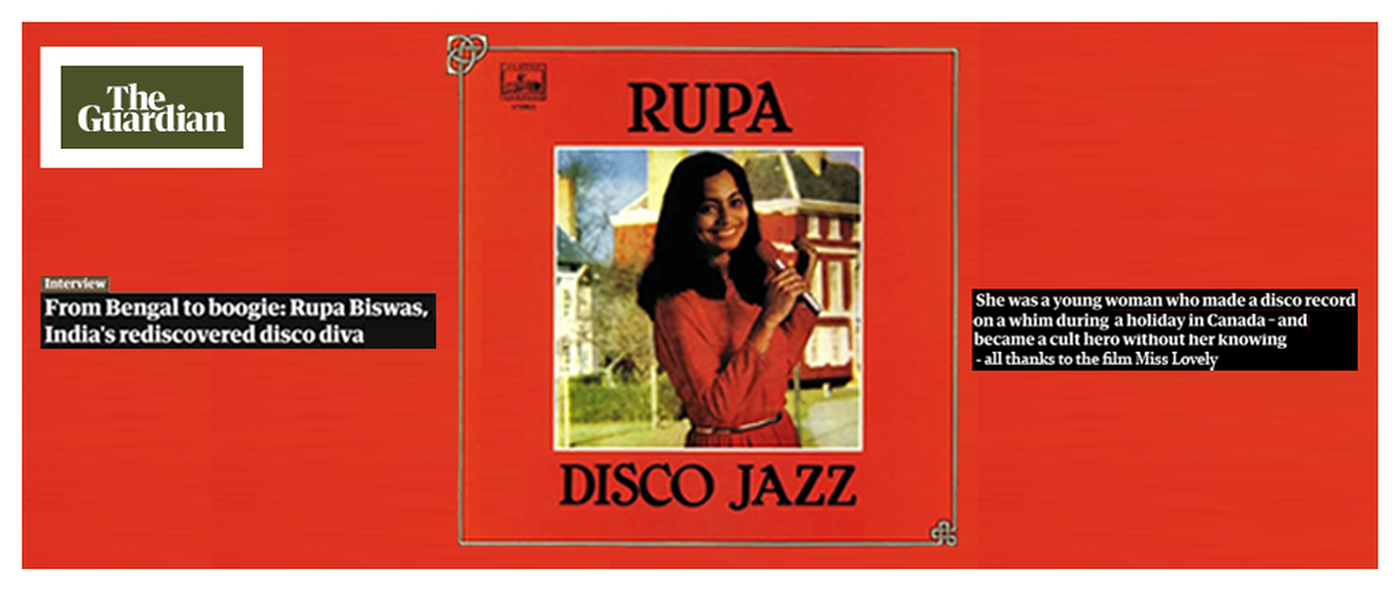Disco diva, first re-discovered on the soundtrack of Miss Lovely, is now a global sensation
THE GUARDIAN JUNE, 2019 BY DHRUVA BALRAM
After her album Disco Jazz sold a handful of copies in 1982, Rupa Sen Biswas faded into anonymity. All that was left was her first name on the album cover, on which she is pictured in a red dress, beaming and holding a cordless mic.
It was only when her son Debayan searched for her record online that they found it had been uploaded to YouTube, that original copies of the record were selling for more than £500, and that it was being reissued by the US label Numero Group. It had earned new fans, such as Dan Snaith, AKA Caribou, and Daphni, who brought it to wider attention after including the track Aaj Shanibar in his DJ sets. That track has now had more than a million streams on YouTube. “Some records are just too good to be true,” Snaith says. “I immediately became obsessed with it. It’s one of those records that stands by itself in its own genre— incorporating Indian pop music, disco, and Balearic, but combining them in a unique way.”
Rupa, now 64, has finally revealed herself. “I’m speechless,” she says over a video call from Kolkata, India. “I still don’t believe it’s real.”
Biswas on the album cover of Disco Jazz.
Biswas on the album cover of Disco Jazz.
The early 80s were the height of the disco era in India. Heavyweights such as Lata Mangeshkar and Asha Bhosle had traded traditional ghazals [poems dealing with loss and love] for glittery bops. Bollywood composer Bappi Lahiri amalgamated Indian instruments with American funk and pop rhythms to create a hybrid genre; celebrated singer Asha Puthli was at the apex of her career, a regular at Studio 54 in New York and photographed by Andy Warhol. Disco Jazz shared the same concept— danceable tracks using Indian instruments, mainly the stringed sarod and tabla drums— even though Rupa had never visited a nightclub.
Born Sukla Biswas in 1955 in Malda Town, west Bengal, she tried and failed to make it professionally before her friend suggested she use Rupa, her nickname at home. Disco Jazz came about after her father took the family on holiday to Canada. “I performed at my brother’s house the first night,” Rupa says. “Two of my family were so impressed, they arranged for another performance.” At the University of Calgary’s Boris Roubakine Hall, in the autumn of 1981, Rupa sang geets and ghazals for three hours to an audience of about 1,000, including the Grammy-award-winning musician Aashish Khan (who collaborated with George Harrison) and his tabla-playing brother, Pranesh.
The Khan brothers were friends of Tilak, Rupa’s eldest brother, and agreed to create an album. She went to the studio to lay down vocal parts written by Firoza, Aashish’s wife, and was handed a cordless mic. “I was confused,” she says, laughing at her own naivety. “I didn’t know what it was. I thought it was a prop.” Until then, Rupa had only worn traditional Indian clothing: saris and salwar kameez. Needing a new dress for the album cover, she settled on one she found in a kids’ section and got her hair cut. Thirty-eight years later, she still has the same hairstyle.
After laying down her vocals over a few days, she flew with her family to the UK, where her brother Chandan lived. “He was the one who paid for the recording,” she says. “It was £1,000. I was too scared to ask Tilak because he was a bit strict.” The songwriters back in Calgary wrote the instrumentation for the record in 12-hour sessions on limited time and an even more limited budget. Months passed and no one contacted her; Rupa had to go out and buy a cassette of the album herself. It was one of a handful of sales. “Nazia Hassan’s big hit, Aap Jaisa Koi, overshadowed everything,” she says. Rupa was an unknown artist whom everyone ignored; disheartened, upset, and with no pathway to continue, she says she “didn’t have the energy to sing, to start over.”
She got married a few years later, gave birth to Debayan, and occasionally freelanced as a journalist. When accompanying her husband, Udayan, a textile engineer, on business trips, she sometimes performed under her old moniker. In 2010, Udayan died.
Unbeknownst to her, the songs on her album were used as a soundtrack to the 2012 arthouse Bollywood movie Miss Lovely and had an unofficial release on German label Ovular, later blowing up online thanks to the patronage of Snaith and others. “Despite in some ways being very much of its time, it still sounds completely fresh,” says Snaith.
“It feels great to have so much love,” Rupa acknowledges. “After all these years, people like my music.” She admits that she wouldn’t trade the life she has now for any fame she would have achieved then. “I don’t care about the money. I’m just happy that people like my music. Boys, girls, everyone is dancing so much. That’s what makes me happy.”
Disco Jazz is out on Numero Group.
